QuestionHi. A feral cat recently adopted us and has been living in our back fenced-in
patio for the last few months. She gave birth to 6 kittens 2 weeks ago in a
little kennel I put out there for her. While she is afraid of me, I now put food
and water out for her, etc...
The kittens were pretty much staying in the kennel, but now I've noticed she
has a few of them scattered in the patio. The one has been in our orange tree
pot all morning, and I haven't noticed her nursing him at all. The other is with
her under the orange tree pot and the remaining 4 are still in the kennel. How
often do kittens at this age nurse? Should I be worried that she has them
seperated? I suppose she could have nursed them when I wasn't paying
attention, but she seems to just be hanging out in the shade under the
orange tree pot and not tending to the kittens still in the kennel (also shaded
but probably not as much) or the kitten up in the pot. I don't hear them
meowing or whining or anything; they are just sleeping. Let me know what
you think.
Thanks!
Sonja
AnswerSonja,
It sounds to me like this is not a good situation. The fact that you don't seem to notice mom caring for the kittens that you mention are separated from her sounds like something is causing mom to reject some of her little ones. You mention that the kittens you haven't seen mom feed aren't very active, the concern that I have is that although kittens of this age do sleep quite a bit they also eat very frequently. I would think that you would have seen signs that she was caring for the kittens. You should know that raising orphaned kittens is labor intensive and time consuming. If you have time to raise these babies (all of the ones mom isn't caring for) I can offer some information and suggestions. The fact that these kittens are so young is a concern, they stand a higher than average chance of dying because their immune systems are not well developed and mom has rejected them for some reason. If you would like to try and save these little ones I would suggest that you take a trip to your local pet store or 24 hour vet clinic to pick up some kitten milk replacer and several syringes. In my experience kittens who have nursed on their mom aren't crazy about taking an artificial nipple, I have had more luck with syringes because the kittens don't have to suck in order to be fed. If the vet clinic doesn't have syringes that they can give you (without the needle attached obviously) then a trip to a 24 hour pharmacy is the next step. You will want to pick up a few oral syringes (the kind used to give liquid medicine to human babies). You will need more than one for each kitten - I would recommend that you pick up 2-3 for each baby because it is not fun trying to refill a single syringe once the babies have realised that their food is coming from a syringe. Right now the kittens shouldn't be handled by anyone who hasn't just washed their hands as their immune systems are not going to be working well especially if it has been awhile since mom has fed them. Kittens that age count on getting antibodies from their mom's milk. You will want to keep these little ones isolated from any other pets in the household. They should be kept warm and cozy, a cardboard box with clean, old towels works well, especially since multiple kittens will tend to sleep in a pile to keep each other warm. You will need to mix the formula according to the directions, different formulas have different directions. The kittens have to eat with all four paws facing the floor because if you feed them like a human baby they can inhale their formula and choke. I recommend that you spread a clean towel on your lap before each feeding or you may find that you need to change your clothing every few hours. The kittens will likely want to eat anywhere from every hour and a half to three hours. It is best if you feed the kittens a bit at a time and then burp them, you can do this by rubbing their little tummies or you can sit them upright and gently tap on their little backs. Burping the kittens cuts down on the air that they ingest which means that more of the tummy will be full of food and the kittens will sleep longer in between feedings. You can allow the kittens to eat until they are full, that way they will be a bit less demanding. Kittens by nature are used to nursing on their mom by demand and mom rarely leaves kittens of this age so they do eat pretty frequently when their mom is feeding them. You will also need to help these babies go to the toilet and keep them clean. Mother cats stimulate young kittens by giving them a bath from head to toe and ending by licking their bottom from genitals to bottom until the babies go to the toilet. The best way to duplicate this is to either use a damp cotton ball or you can use scraps of an old towel that are damp, cotton balls are my first pick because they are disposable. You will start by washing the food off of the kitten's faces and cleaning their face. You will also want to keep their bodies clean so a few wipes with a clean damp cotton ball works well. You will also clean the kittens' tummies by gently rolling them (careful, kittens can be wiggly and slip right off of your lap) and starting at the chest and working down to the genitals. You will want to be patient and persistant when you are trying to get the kittens to use the toilet, most kittens will pee fairly readily, but it can take 5-10 minutes to get the kittens to poop. Kittens this age don't poop every day, but it is best if you still try after every feeding. Don't be alarmed by the kittens grumbling about their baths, they do it with their mother. At about 3-3 1/2 weeks you will want to slowly start to mix either a good quality soft kitten food or meat based baby food into their formula so that they can have the extra nutrition that they would get by mom's milk changing to meet their needs. An alternative to the mess and fuss of trying to use the formula to water down baby food or pureed meat sufficiently to get it through the syringe is a kitten weaning formulas available. Kitten weaning formulas can be slowly introduced to the kittens in their formula. Because kittens who are hand raised tend to be smaller than the ones nursed and cared for by their mother it is a good idea to slowly introduce solid food (soft kitten food or meat and broth baby foods) as soon as the kittens will take it simply because there isn't enough nutrition to support their rapid growth. You will also want to be sure that the kittens are weighed regularly to be sure that their growth remains steady. I am sure that you will have many questions over the next little while if you do decide to hand rear these little ones. I am willing to offer suggestions that will help you to raise these guys.
If you find that you are unable to care for these little ones I would recommend that you take them to a nearby vet clinic or animal shelter. I hope that you have found this information helpful. If you have any further questions or concerns, please don't hesitate to contact me again.

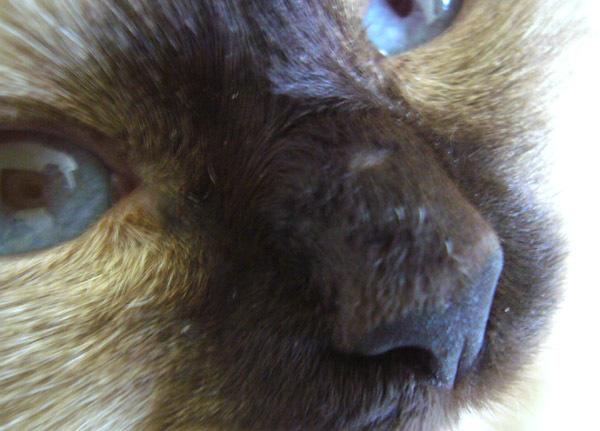 Bald spot on my cats nose
Question
bald spot
Hello Jessica,
Today I notic
Bald spot on my cats nose
Question
bald spot
Hello Jessica,
Today I notic
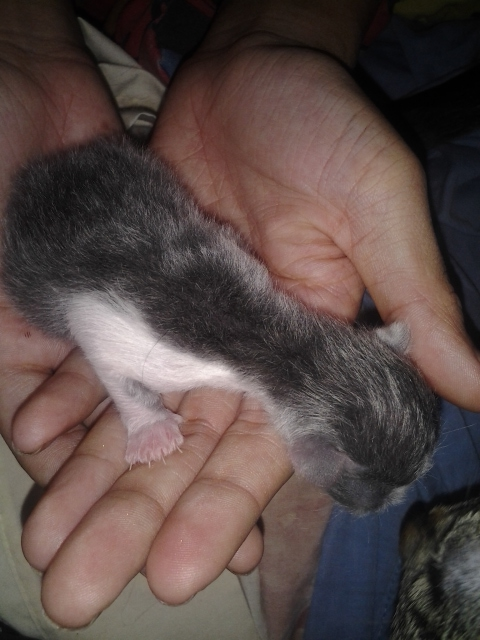 Help with Two Female cats Please!!!
Question
the kitten Cats
Hello, I have two
Help with Two Female cats Please!!!
Question
the kitten Cats
Hello, I have two
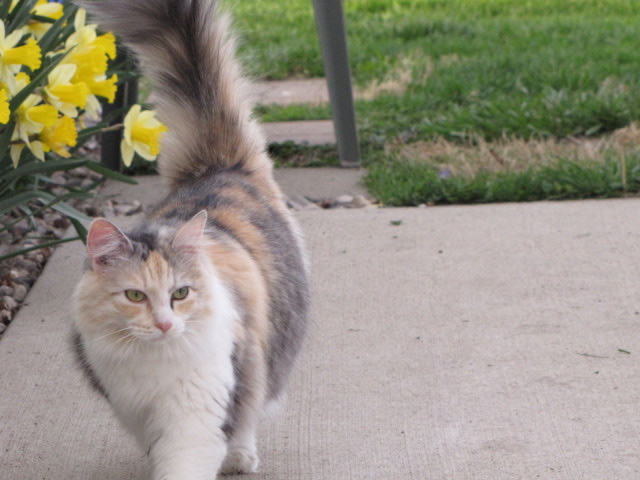 Breed
Question
Sammy Sammy
We found this cat out
Breed
Question
Sammy Sammy
We found this cat out
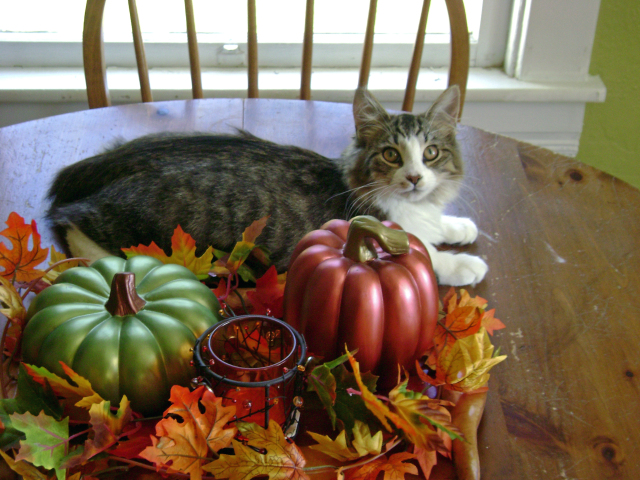 The breed of my 5 1/2 month old kitten
Question
Edmund 5 1/2 months ol
Hi, my husband and I re
The breed of my 5 1/2 month old kitten
Question
Edmund 5 1/2 months ol
Hi, my husband and I re
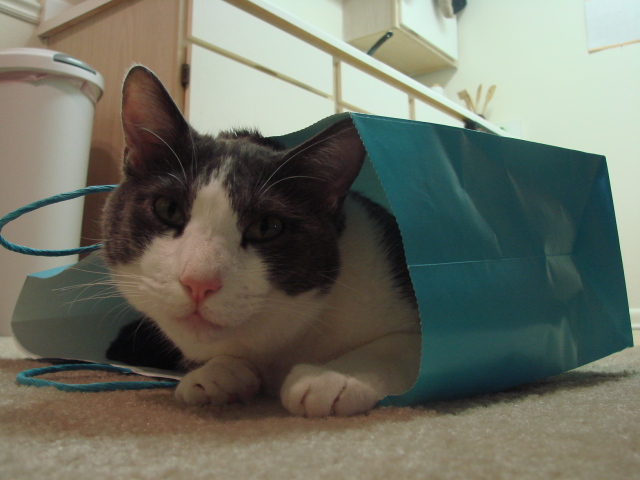 Cat behavior question...
QuestionZero the goofball
QUESTION: Hi Kate,
I
Cat behavior question...
QuestionZero the goofball
QUESTION: Hi Kate,
I